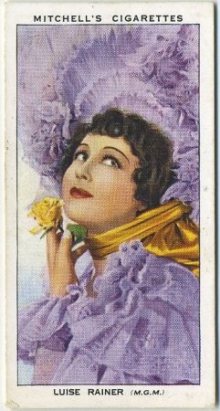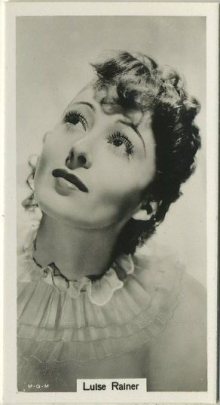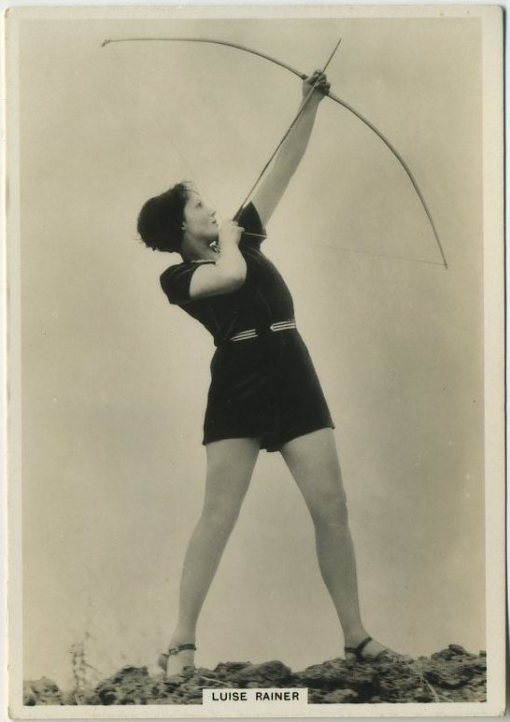Luise Rainer, two-time Academy Award winner, died of pneumonia on Tuesday at age 104.
Rainer is remembered as much for the rapid rise and fall of her Hollywood career as she is for the two Oscars igniting that ascent. She earned those awards for performances in The Great Ziegfeld (1936) and The Good Earth (1937), two of only eight films she appeared in during her stay at MGM between 1935-1938. Her first at the studio, Escapade (1935), is unavailable to the public, but U.S. viewers will have an opportunity to see the other seven on Turner Classic Movies, Monday, January 12, 2015, during what was intended to be the classic film network’s celebration of Miss Rainer’s 105th birthday.
That marathon begins at 6:00 am Eastern with The Great Ziegfeld and concludes with TCM host Robert Osborne’s delightful conversation with Miss Rainer at the 2010 TCM Classic Film Festival, which begins at 7:30 pm.
 Luise Rainer was born in Dusseldorf, Germany on January 12, 1910. She began acting on the stage at age 16 and was soon discovered by Max Reinhardt, who she performed for in Berlin and Vienna. “I went from one part to another, acting in all the great plays,” Rainer recalled in 1983. “After five years, I came to Hollywood.” She was cast in Escapade opposite William Powell after Myrna Loy asked out of the film. Her next two movies were her Oscar winners. What followed were anything but. A notorious scrap with Louis B. Mayer led to her walking out on her contract with MGM. Rainer often recalled the story:
Luise Rainer was born in Dusseldorf, Germany on January 12, 1910. She began acting on the stage at age 16 and was soon discovered by Max Reinhardt, who she performed for in Berlin and Vienna. “I went from one part to another, acting in all the great plays,” Rainer recalled in 1983. “After five years, I came to Hollywood.” She was cast in Escapade opposite William Powell after Myrna Loy asked out of the film. Her next two movies were her Oscar winners. What followed were anything but. A notorious scrap with Louis B. Mayer led to her walking out on her contract with MGM. Rainer often recalled the story:
“I went to Louis B. Mayer and told him, ‘Mr. Mayer, I must stop making films. My source has dried up. I work from the inside out, and there is nothing inside to give.’ He said to me, ‘What do you need a source for? Don’t you have a director?’” (Thomas).
A fascinating 1941 interview with journalist Elliott Arnold offers Rainer’s thoughts on the split in the more immediate aftermath of her departure from MGM.
 “I didn’t have the strength to fight the thing out. It was easier not to fight at all. I did not just want to act a part, to say words someone else had written, words I did not believe in.”
“I didn’t have the strength to fight the thing out. It was easier not to fight at all. I did not just want to act a part, to say words someone else had written, words I did not believe in.”
Her ideas essentially remained the same over the years, though she was less willing to drop names at first:
“I do not wish to say anything against anyone. I will just say that they believe in Hollywood that always you must play down, play down, play down to the audience.”
Luise Rainer wanted better roles and didn’t want to play any more Frou Frous, referring to her character from The Toy Wife (1938).
At the time Arnold spoke to her, Rainer was preparing to appear in a Maplewood, New Jersey revival of J.M. Barrie’s A Kiss for Cinderella. She returned to Hollywood for one last Golden Age feature, Hostages at Paramount in 1943. It was her last English language feature film until her supporting role in The Gambler in 1997 at age 87. Rainer appeared on various TV anthology series between 1949-54, with her later series appearances on Combat in 1964 and The Love Boat in 1984 creating new opportunities for press and public to speculate over her brief but spectacular Hollywood career. Rainer cooperated in interviews during those returns to the spotlight and also in the years that followed, especially when the Academy Awards presented an annual occasion for people to remember her.
Rather than going to the two most obvious places, I chose to remember Luise Rainer on Tuesday evening by watching one of her lesser films, Big City, a drama about the taxi wars directed by Frank Borzage. Rainer is paired with her fellow 1937 Academy Award winner, Spencer Tracy, who would repeat his co-star’s feat and take home a second consecutive Oscar himself the following year. They are a young married couple in New York, Tracy a very regular guy who operates an independent taxi, and Rainer his young wife, an émigré from Europe. The movie features a bizarre ending that puts Jack Dempsey, Jim Thorpe, and several other mostly forgotten athletes to work in a brawl against the rival cab company. It’s an abrupt change in mood from what’s come before and more or less ruins the movie, though it had been growing tedious for awhile before turning slapstick without warning.
But before the taxi battles grow too serious, Big City delivers several wonderful minutes shared between the two current Oscar winners. Luise Rainer is down-to-earth and actually looks like she’s having a lot of fun playing the carefree wife of all-American Spencer Tracy. In the first scene they meet on the street and act as though they don’t know each other, but after Rainer protests Tracy’s advances within earshot of a helpful beat cop, she leaps into his arms to declare it all a bit of fun role play. Perhaps she’s leaping into his arms a bit too much during this section of the movie, but the two seem made for each other and are easy to believe as a lovestruck young couple still completely infatuated with one another. Some of this is retained as we enter the taxi war, but the street battles seem to become the emphasis before we all but forget about Rainer by the wild ending.
I enjoy those those first ten or so minutes of Rainer and Tracy more than I do all of the histrionics poured over the phone in Ziegfeld or even the more introspective performance Rainer gives in The Good Earth. Those Academy Award winning assignments took some heavy lifting to accomplish, but never has Rainer appeared more at home, a flesh and blood human being, than she does at the open of Big City.
“I was in Hollywood too early, I think. Now actors can take only the roles they want to do. When you were under contract, you had to do roles whether you liked them or not. I fought. I was not so much glamorous as clamorous. I was full of fire and enthusiasm and very hard on myself.”
The Los Angeles Times and New York Times offer two very detailed obituaries covering the life of Luise Rainer. Both include details of her brief and stormy marriage to playwright Clifford Odets, as well as her much more successful marriage to publisher Robert Knittel.
I also recommend Terry Towles Canote’s post at A Shroud of Thoughts, as Terry always combines a heartfelt goodbye with a concise biographical entry when we lose a favorite entertainer.
Cited:
- Elliott Arnold, “Luise Rainer Works In Asylum, ‘Toils to Be Useful,’ She Says,” Pittsburgh Press, September 20, 1941, 10.
- Bob Thomas, “Luise Rainer Retains her Vivacity at 73,”Ocala Star-Banner: TV Week, November 12-18, 1983, 14.






Very well done, Cliff! Even though Luise Rainer’s career was brief, I’m surprised that she’s not held in the same high regard as many classic movie stars. She held your own against the biggest stars of the late 1930s.
Thanks, Rick! Those two Oscars will definitely keep us from ever forgetting her, but it is a shame that there aren’t more movies for new fans to find once they see her in those. I agree, she measured up to giants like Muni and Tracy, and that’s saying a lot!